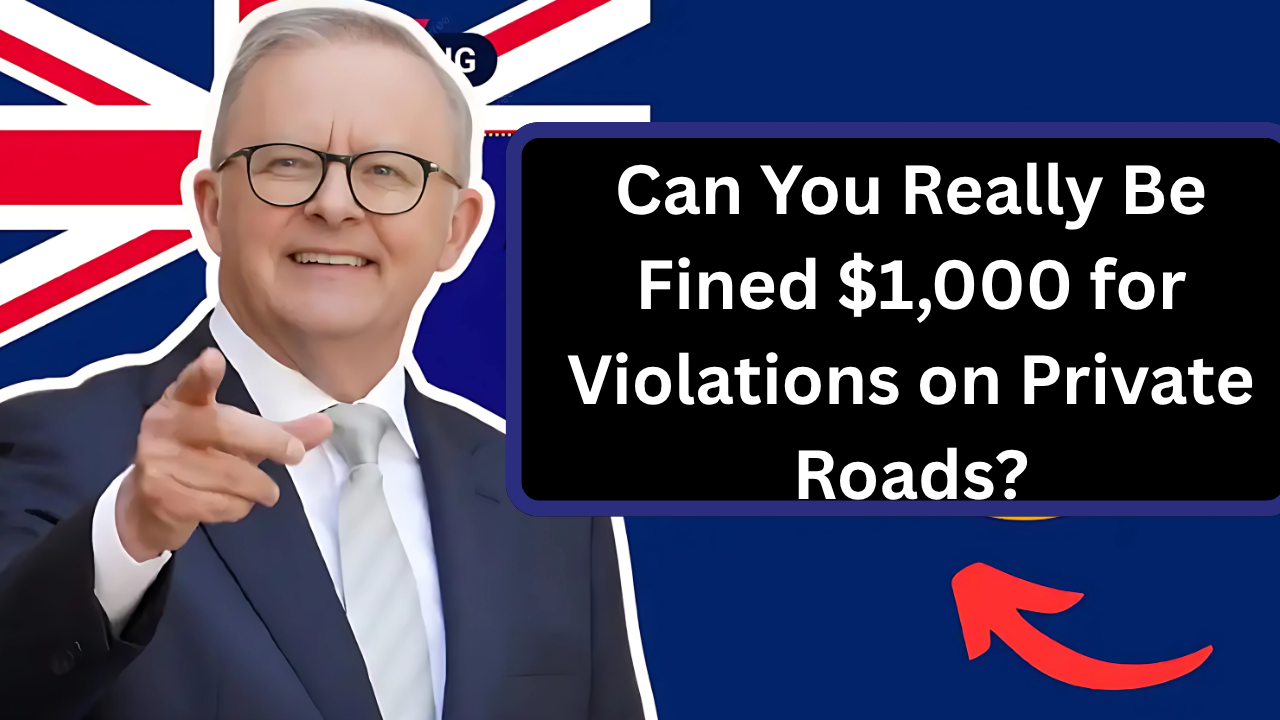In Australia, road rules are a critical part of maintaining safety and order on public highways, streets, and motorways. However, a question that has sparked debate among drivers is whether you can be fined for traffic violations on private roads—such as those within private estates, car parks, or rural properties. Recent discussions, including posts on social media platforms have suggested that drivers could face hefty penalties, with claims of fines up to $1,000 for violations on private roads or parking lots. But is this true? Can you really be fined for actions on private property, and if so, under what circumstances? This article delves into the complexities of traffic laws on private roads in Australia, examining legal frameworks, enforcement mechanisms, and real-world implications for drivers.
Understanding Private Roads in Australia
Private roads are distinct from public roads in that they are owned and maintained by individuals, businesses, or entities rather than government authorities. These can include driveways, roads within private estates, shopping centre car parks, or access tracks on private land. Unlike public roads, which are governed by state and territory road traffic acts, private roads fall under a different legal scope. However, the line between public and private can sometimes blur, especially when private roads are accessible to the public or used in a manner akin to public thoroughfares.
In Australia, each state and territory has its own road traffic legislation, such as the Road Traffic Act 1961 in South Australia or the Road Safety Act 1986 in Victoria. These laws primarily apply to public roads, but certain provisions can extend to private property, particularly when it involves public safety or specific types of violations. The claim of a $1,000 fine for violations on private roads, as mentioned in some online discussions, warrants a closer look at how these laws are applied and enforced.
The Legal Framework: When Do Road Rules Apply on Private Roads?
The application of road rules on private roads depends on the jurisdiction and the nature of the road in question. In general, Australian road traffic laws are designed to regulate driving behaviour on “roads” or “road-related areas.” The definition of these terms is crucial. For example:
-
In Victoria, the Road Safety Act 1986 defines a “road” as an area open to or used by the public, including highways, streets, and sometimes private roads that are accessible to the public. A “road-related area” includes car parks, vacant land, or other areas open to public vehicle use, whether publicly or privately owned.
-
In New South Wales, the Road Transport Act 2013 similarly extends certain road rules to private roads that are open to the public, such as shopping centre car parks or private estates with public access.
-
In Queensland, the Transport Operations (Road Use Management) Act 1995 applies to roads and areas where the public is permitted to drive, which can include private property under specific conditions.
The key factor is whether the private road is “open to or used by the public.” If a private road or car park allows public access—such as in a shopping centre, university campus, or residential estate—it may be subject to the same road rules as public roads. This means that violations like speeding, reckless driving, or drink driving could attract fines, even on private property.
Can You Be Fined $1,000?
The claim of a $1,000 fine for violations on private roads appears to stem from discussions about specific penalties for reckless or dangerous driving behaviours, such as hooning (anti-social driving like burnouts or street racing). For instance, a post on X dated June 9, 2025, suggested that a new “excessive” law could impose fines up to $1,000 and vehicle confiscation for violations on private roads or parking lots. While this claim lacks detailed context, it aligns with penalties in some jurisdictions for serious traffic offences, even on private property.
Examples of Applicable Fines
-
Hooning Offences: In Queensland, hooning behaviours like burnouts or street racing are covered under the Police Powers and Responsibilities Act 2000. These laws apply to both public and private roads if the behaviour endangers public safety. Penalties can include fines up to $1,078 for using a mobile phone while driving (one of Australia’s highest fines for this offence) or vehicle impoundment for hooning. Similar provisions exist in other states, such as South Australia’s Criminal Law (Clamping, Impounding and Forfeiture of Vehicles) Act 2007.
-
Speeding and Reckless Driving: In Victoria, speeding or reckless driving on private roads open to the public can attract fines based on penalty units. As of 2024, one penalty unit in Victoria is approximately $192.31, and serious offences like excessive speeding (over 25 km/h above the limit) can carry fines of 3–20 penalty units, equating to $576–$3,846, plus demerit points or licence suspension. While a $1,000 fine is plausible for serious violations, it would depend on the specific offence and jurisdiction.
-
Drink and Drug Driving: Drink or drug driving laws are particularly stringent and can apply on private roads if they are accessible to the public. In South Australia, for example, penalties for drink driving include fines, licence disqualification, demerit points, and even imprisonment for repeat offences. These penalties apply regardless of whether the offence occurs on a public or private road, as public safety is the overriding concern.
-
Parking Violations: Parking on private land without permission, such as blocking access to a driveway or parking in restricted areas, can result in fines. In Queensland, parking illegally on private property can lead to fines of up to $11,000 if it involves trespassing or obstructing access. Local councils or private parking management companies may also issue infringement notices for violations in private car parks.
Enforcement on Private Roads
Enforcement of road rules on private roads typically requires the involvement of police or authorised officers. For example:
-
Police Authority: Police can issue infringement notices for traffic violations on private roads if the road is deemed a “road-related area” under state law. This is common in shopping centre car parks or private estates with public access.
-
Local Councils: Councils may issue fines for parking violations on private property, particularly in areas like shopping centres or hospitals where public access is common.
-
Private Entities: Private property owners or parking management companies, such as PriPark in Queensland, can issue fines for parking violations, but these are typically enforced through private contracts rather than road traffic laws. However, failure to pay such fines can escalate to legal action.
If a private road is entirely closed to the public (e.g., a farm track or a gated community with restricted access), road traffic laws generally do not apply, and fines for violations like speeding or reckless driving are unlikely unless the behaviour directly endangers others or involves a criminal offence.
Challenging a Fine on a Private Road
If you receive a fine for an alleged violation on a private road, you have options to challenge it:
-
Request a Review: In Victoria, you can apply for an internal review through Fines Victoria within 28 days of receiving an infringement notice. You’ll need to provide evidence that the road was private and not open to the public, or that the offence did not occur as alleged.
-
Nominate Another Driver: If you were not the driver at the time of the offence, you can nominate the responsible person through Fines Victoria or the relevant authority.
-
Court Dispute: You can choose to have the matter heard in a Magistrates’ Court, but this carries risks, such as higher fines or a criminal record if the court upholds the infringement.
-
Official Warning: In some cases, Victoria Police may withdraw a fine and issue an official warning, particularly for minor offences (e.g., speeding less than 10 km/h over the limit) on private roads, provided you have a good driving record.
It’s advisable to seek legal advice before challenging a fine, as court proceedings can be costly and complex. Resources like Victoria Legal Aid or community legal centres can provide guidance.
Case Studies and Real-World Examples
To illustrate, consider the following scenarios:
-
Shopping Centre Car Park: A driver is caught speeding at 60 km/h in a 20 km/h zone in a shopping centre car park in Melbourne. Because the car park is open to the public, Victoria Police issue an infringement notice with a fine of $769 (4 penalty units) and 3 demerit points. The driver can request a review but must prove the car park is not a “road-related area.”
-
Private Estate Burnout: In Queensland, a driver performs a burnout on a private road within a gated community. A resident reports the incident, and police issue a hooning fine of $1,078 and impound the vehicle, as the behaviour posed a risk to public safety.
-
Farm Track Incident: A driver is caught drink driving on a private farm track with no public access. Since the track is not a “road-related area,” road traffic laws do not apply, and no fine is issued unless the driver’s actions cause harm or involve other criminal behaviour.
Implications for Australian Drivers
The possibility of a $1,000 fine on a private road is not far-fetched, particularly for serious offences like hooning, reckless driving, or drink driving on private roads accessible to the public. Drivers should be aware that:
-
Public Access Matters: If a private road or car park is open to the public, standard road rules often apply, and fines can be issued.
-
Penalties Vary by State: Each state has different penalty structures, but fines of $1,000 or more are possible for serious violations.
-
Enforcement is Context-Dependent: Police and councils are more likely to enforce rules in high-traffic private areas like shopping centres or residential estates than on secluded private property.
-
Stay Informed: Checking your state’s road traffic laws and consulting legal resources can help you understand your rights and obligations.
In Summary
While the claim of a $1,000 fine for violations on private roads in Australia may sound alarming, it is grounded in the reality of certain traffic laws. Private roads that are open to or used by the public can be subject to the same rules as public roads, and serious offences like hooning or drink driving can attract significant penalties. However, on truly private property with no public access, road traffic laws are less likely to apply. To avoid fines, drivers should exercise caution, respect private property rules, and stay informed about their state’s traffic regulations. If you receive a fine, act promptly to review or dispute it, and consider seeking legal advice to navigate the process effectively.

